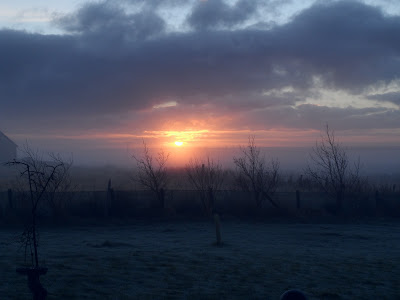I was pleased to have Tentacular want to publish my poem, 'You cant say No.' It is a look at women's work--insert here the usual disclaimer: it is not exclusively women that mend and darn and knit and stitch all maner of things--some alluded to in the poem. Nonetheless, it was invariably the death of an aunt or mother or grandmother that sent grieving relatives looking for a home for the relics--for that is what they were--of their loved one. It is a bit of humour with some grain of truth in that whenever an archaelogist finds something that cannot be explained in their own terms, it is deemed 'probably of ritual use.' And that is what had become of these pins and needles, bits of wool, handwritten notes. The relatives knew they had some value, so they would not discard them or casually cast them aside, but they had lost the sense of them.
I never said No to their urgent requests for a safe home for the items. Sometimes I would get a bit of story about the person or the items, but usually they were just passed on hurriedly with obvious relief and a grateful smile. These donations made me sad because it meant a talented pair of hands was gone; more
importantly, it made me sad because tools are living breathing things
and they had been reduced now to artefacts. It was that sadness that prompted the poem. Stephen King is said to be a cheerful
person who writes his nightmares away. My poems are often sadness that
is caught and wrapped into a safer place.
Women's work is essential and frequently invisible. Elizabeth Wayland Barber was able to learn much about linen and ancient Egyptian textile arts because the linen wrappings of the mummies were of so little value that they were discarded and left in the tombs where grave goods and mummies were carried off and highly touted. For marvellous insights into 'women's work' her book is a gold mine: Women's Work: The First 20,000 Years has been shared among my crafting friends and, as I typed this, I bought an e book version of it to read it again.
Urban myths and conspiracy theories are said to prevail because they hold to 'truths' that can't be disproven. I fear the image of women's work as domestic frippery may be among those myths that does not easily disappear. With naivete and enthusiasm I set about to fill the knowledge gap in knitting by putting together an intergenerational knit group, Northern Loops. I received funding from an agency that despite my best efforts failed to understand that knitting--the ability to see something and make it a reality is intellectual property, which in and of itself is valuable--more valuable than the end products in many cases. Some of my efforts to describe what knitting could do may still be available on the internet someplace. The funders' best understanding was that knitters up north could do christening shawls for the London market and make some money. Like the women with the leftover tools, the funders understood women's work only in the artefacts.
For me, the other side of women's work is the agency of the women. It should be obvious that it is empowering to be able to make things, but that seems not to be understood. In making things there is not only the benefit of the object created but in the conceiving and making itself. Makers can give voice to their feelings and effect political change. Classic examples are the suffragettes wearing their colours in their sashes and carrying their banners. An American example is a wife who cut her husband's Ku Klux Klan costume into pieces and reshaped it into a quilt. And we know much of the history of our world because it was stitched into tapestries. And that prompted another poem, a testament to agency, Knots.
Knots
The wind like a curious calf
tugs at the knot holding the farm gate shut
teasing one end
then the other
the nut hard centre holds fast
The wind moves on to test
tender branches and fledglings
it conjures sea foam into white horses
galloping towards the shore
Inland it staggers
like a drunk looking for a fight
tumbled rubbish bins
skittering along the street
I know this wind
like the trees in my small patch
where they lean themselves leeward
and hope their roots stay anchored
in the patient earth
I am waiting for her return
When the sturdy steel gate swings free
I am already there moving crab like into the wind
the salt wind stinging my eyes
until I can lean my shoulder into the wild gate
Step by step I soldier toward the gate’s anchor
hurled back again and again
on the third try I have the gate where I want it
the wind regroups the gate shakes
My hands are stiff with cold
but my fingers know a different kind of knot
soft loops of the knitter, the weaver, the mender of clothes
I wrap and knot and wrap and knot and wrap and knot
the gate rattles
the ends of the knots dance freely
yielding without giving way


